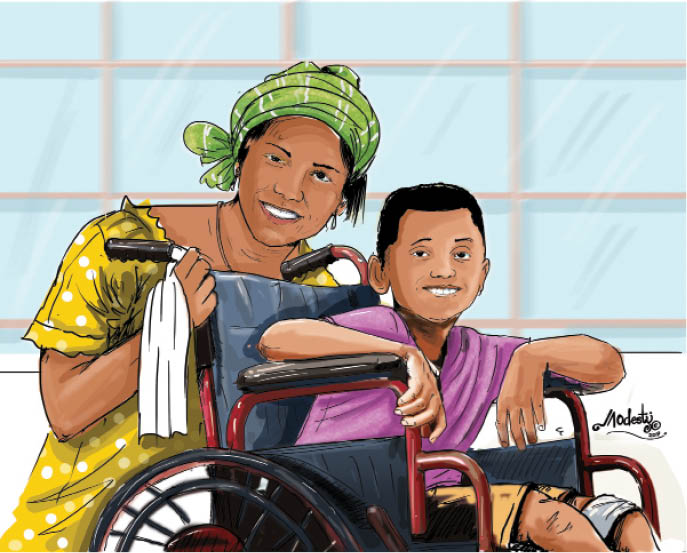Handling children with special needs
Mrs Yakubu’s five year-old-son was found to have health issues when he was barely few months old. The mother said she noticed that the child’s neck was not stable when it was supposed to and that they used herbs prescribed for her to bathe the baby with because they could not afford to take him […]

Handling children with special needs
Mrs Yakubu’s five year-old-son was found to have health issues when he was barely few months old. The mother said she noticed that the child’s neck was not stable when it was supposed to and that they used herbs prescribed for her to bathe the baby with because they could not afford to take him to a clinic.
Although she had a child before this, she said she attended antenatal clinic only a few times before delivery. “That was the same thing with my first child too but she is doing well unlike her little brother. It took almost a year before he started crawling. He also stood on his feet late.
“Also he is five years old now but when he speaks, he is not coherent like other children his age. It gives us a lot of worry because we have to do virtually everything for him,” said.
However, Mrs Yakubu is not alone in this worrisome situation because many parents have to tackle such problem with their children that have special needs. Some of these children come down with issues such as deafness, dumbness, blindness, autism and so on.
Special needs in children is defined as any of various difficulties – physical, emotional, behavioral, or learning disability or impairment – that cause an individual to require additional or specialised services or accommodations.
Parents are often stressed when their children with special needs cannot communicate to them clearly when they need something or expressing themselves in clear terms.
Summit Developmental Disability Children Service (Summit DD’S) revealed that some children with special needs may not have the cognitive or verbal skills to communicate with parents or caretakers when they are unhappy with a situation but negative behaviours such as hitting, kicking, spitting, tantrums or meltdowns become a form of communication leading to frustration for both parents and children.
The senior manager, Summit DD’s Children Service, Tina Overturf, said children learn through consistency and routine adding that staying consistent is both an organisational tool for parents and caretakers and comforting to children.
“Just as important as consistency and routine, is understanding and working within the confines of the child’s developmental level,” she added.
A clinical psychologist, Seth Meyer, said the demands of having special needs children have a definite effect on parents, adding that having a special needs child brings with it many of the typical joys of parenting, but comes with major drawbacks for the parents.
He said the special need in children does not mean only chronic illnesses but can come in the form of, emotional needs, including children who have a psychiatric diagnosis such as, severe cases of depression or other mood disorders, psychosis, autism, and other emotional and/or cognitive disorders.
The coordinator, Hear Well Speak Well Foundation, Mr Godwin Ebhote, said the first thing parents should know is that special needs in children are part of the reality of life and not as a result of age, race, status, class, geographical location, financial level and others, but something that can happen to anybody or any family in any location.
“Parents should know they are not alone in this because it happens to children across board. It is just that we have an unfortunate situation in this part of the world because some medical issues that would have been discovered at an early stage of a child and be attended to may not be discovered early.
“When a woman is pregnant in developed countries, if there is an issue with the fetus it will be discovered or immediately the child is born and treatment would commence but the reverse is the case here,” he stated.
He said adequate and reliable information is needed to attend to such children but oftentimes people don’t also get such thereby getting some parents frustrated because of the child’s situation.
According to him, many parents miss it when they start using faith instead of facing the reality and attend to the child’s need accordingly.
Ebhote said there is nothing wrong in praying but it is not good to neglect the health needs of such child, adding that some parents prefer to take such child to prayer houses instead of accepting the reality and taking proper steps to care for the child.
“You see them taking the child to different prayer houses and herbalists. Some parents also try to fight, pray and argue with God as if he is not aware of the situation,” he noted.
He said, we must learn not to neglect the child, adding that doing that amounts to breaching his or her fundamental human right. “As an adult, you can do that with your life but when it comes to children, you take responsibility and act,” he stated.
He advised parents to put on the right attitude explaining that forming a support group where such parents can come together, talk together and share experiences will help reduce the burden and help them cope with their situations.
He said also that such parents need counseling, advice and empowerment to handle the situation better and help them show love to the children.
